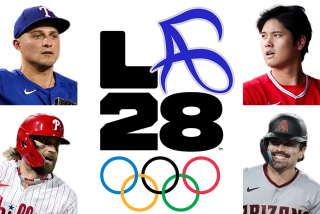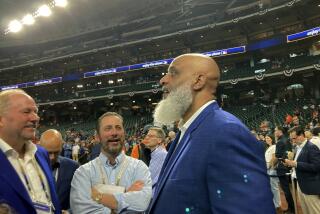Players Poised to End Strike : Baseball: Vote calls for just that, but only if judge issues injunction restoring arbitration and free-agent bidding.
- Share via
The executive board of the baseball players’ union took an expected step Wednesday, voting unanimously to end the 7 1/2-month strike if the National Labor Relations Board obtains an injunction reinstating key provisions of the expired labor agreement. U.S. District Court Judge Sonia Sotomayor may rule on the injunction request after a hearing Friday.
In the meantime, union officials prepared a response to the proposal made by owners Monday night. That proposal, they say, is unacceptable to the players because of the 50% payroll tax and the threshold, $44 million, at which it is triggered.
Union leader Donald Fehr said he expects to make a counterproposal today, and acting Commissioner Bud Selig confirmed that late Wednesday night, adding that he will fly to New York from Milwaukee Thursday morning.
Selig skirted the question of whether the owners’ proposal was the final, non-negotiable offer he implied it was Monday night.
“I was as sincere as I could be when I said the clubs had stretched as far as they could in making that proposal, but let’s see how the union responds,” he said.
While there are ancillary issues that concern the union, the bargaining dispute has basically come down to the question of the tax.
Philadelphia Phillie pitcher Curt Schilling, attending the player meetings of the last two days in New York, said he thought the union was prepared to counter with a 30% tax, up from the 25% of their previous offer, and a threshold of $49 million or $50 million, down from $54.1 million.
Fehr said the union proposal had not been completed, but the sides are within compromise distance, if they have the will to compromise.
“We’re definitely on the same planet. We’re even on the same continent,” union lawyer Eugene Orza said. “If the clubs have a will to make a deal with the players that addresses their needs, then a deal can be made. If the clubs still have a desire to break the union, then a deal can’t be made.”
With the season scheduled to start with replacement players on Sunday night, many on the union side still believe that many owners want to go that route to see how many major leaguers break ranks. Many on the management side believe the union won’t bargain seriously until the injunction is resolved.
In a 38-page brief filed Wednesday, management lawyers said the clubs have lost $700 million because of the strike and urged Sotomayor to proceed slowly and cautiously, arguing that the respective parties should determine how the dispute is settled, not the court.
“If the court issues the requested injunction, the union . . . will have a compelling reason to delay further serious negotiations until the late summer or early fall, when it is again advantageous to strike the clubs,” the brief said.
“The union’s offer to end it’s seven-month strike in return for an injunction should have absolutely no bearing on this court’s review of the petition,” the lawyers wrote, adding there is no evidence that management’s Player Relations Committee has “altered or eliminated” the provisions in question.
“The purpose of that argument is to create an artificial emergency that would require extraordinary relief before the court can carefully review the relevant legal and evidentiary issues,” the brief said.
The NLRB contends that the owners illegally eliminated salary arbitration, free-agent bidding and the anti-collusion clause of the expired agreement after agreeing to restore all terms and conditions of the agreement when they withdrew the implemented salary cap on Feb. 3 to avoid NLRB sanctions for declaring an illegal impasse.
In a 35-page brief filed with the court on Monday, NLRB lawyers wrote that there is “reasonable cause” to believe that the owners’ unilateral changes violated the National Labor Relations Act. The injunction, they wrote, “is necessary to prevent further harm to the collective bargaining process” and “to prevent further industrial unrest and strife.”
If those changes are allowed to remain, they continued, the NLRB could never reconstruct “what players would have earned” under the previous system, and the owners’ “illegal conduct would affect composition of the clubs and taint the integrity of the competition itself.”
The NLRB has established an impressive record of obtaining inunctions and withstanding appeal on the basis of demonstrating reasonable cause alone. The ultimate question of whether owners were guilty of unfair labor practice will be determined by an administrative law judge in a hearing that begins May 22.
The owners are expected to appeal an injunction, if it is granted, and could request a stay while the appeal is pending. They may also institute a lockout, providing 21 of the 28 clubs approve, which is uncertain. Moderates say they expect six clubs--the Dodgers, Baltimore Orioles, New York Mets, Toronto Blue Jays, New York Yankees and San Diego Padres--to vote against a lockout, if it comes to that. They hope the Cleveland Indians, Texas Rangers, Colorado Rockies and Boston Red Sox join them.
It would go to a vote, however, only if Selig knows he has the votes. In the meantime, management sources said that even hard-line attorney Robert Ballow, who has emerged as one of the owners’ primary consultants in recent weeks, has advised against locking out, citing enormous financial risks if the lockout is deemed illegal.
“It would be a risky tactic, indeed, to try and subvert an injunction,” union attorney Lauren Rich said.
Only the Orioles, and possibly the Mets and Blue Jays, are expected to cast negative votes today when the owners make it official in phone balloting and approve the use of replacement players during the season.
More to Read
Go beyond the scoreboard
Get the latest on L.A.'s teams in the daily Sports Report newsletter.
You may occasionally receive promotional content from the Los Angeles Times.










